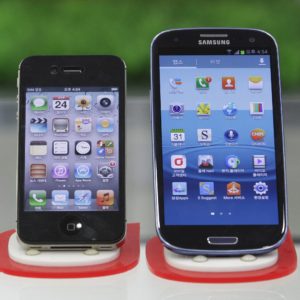Apple wants the U.S. Supreme Court to stay out of its latest patent dispute with Samsung, and it has no qualms with the telling the court itself. But technology advocates are asking the high court to offer more clarity on patent law.
Last week, the iPhone maker filed a brief with the nation’s highest court asking it to reject a petition by Samsung. The South Korean electronics manufacturer is trying to appeal a recent court loss for infringing on several iPhone patents, which could cost it $119.6 million in damages if the ruling stands.
“Samsung’s petition challenges two Federal Circuit decisions, neither of which implicates any broad or dis-puted question of substantive patent law,” Apple said in a brief filed Monday.
The iPhone maker goes on to assert the case isn’t worthy of the court’s attention because it doesn’t question the interpretation of any patent laws, and would therefore be a poor choice for setting legal precedent (this is not to be confused with the first Apple v. Samsung case the high court decided in December, in which the court decided the case for Samsung based on a question of interpretation).
Apple attempts to dismantle the three parts of Samsung’s appeal to the Supreme Court; saying Samsung failed to prove two of the patents it allegedly copied were “obvious” (in patent law, obviousness is a term used to describe features undeserving of patents); that the Federal Circuit Court of Appeals correctly issued an injunction against Samsung from using the patented features; and that the court correctly upheld a prior jury’s verdict that Samsung violated a now-expired patent based on “substantial evidence.”
“Samsung and Apple are direct competitors, Apple produced abundant evidence showing that consumers value the patented features, and (as Samsung’s own amici acknowledge) the injunction is appropriately narrow, requiring only that Samsung excise specific infringing features that it had represented could be easily replaced,” the brief reads. “The petition should be denied.”
Consumer and technology advocates including the pro-net neutrality group Public Knowledge (PK) and digital privacy advocacy organization Electronic Frontier Foundation (EFF) disagree. In a brief to the court filed in April both said the Supreme Court should grant Samsung’s request for a review based on the obviousness of the slide-to-unlock feature, which they believe the Federal Circuit misinterpreted.
Counter to Apple’s argument, they and others claim letting the case stand could have significant impact on growing tech sectors like 3D printing, where patent trolls are already filing a range of lawsuits based on questionable patents on materials.
The original case began in a California federal district court in 2014, where Apple sought more than $2 billion in damages from Samsung for infringing on Apple patents for slide-to-unlock, autocorrect, and text-to-link features. Samsung countersued over patents it holds for multimedia sync and universal search features.
Both companies were found to have infringed on each other’s patents, with a jury awarding Apple $119.6 million for all three of its patents and Samsung $158,400 for a patent describing a method for organizing photos and videos into folders. United States District Court for the Northern District of California Judge Lucy Koh presided over the case — the same judge that first heard the last Apple v. Samsung patent dispute to reach the Supreme Court.
A three-judge panel on the U.S. Court of Appeals for the Federal Circuit threw out that verdict last February, describing all of Apple’s patents as obvious while upholding Samsung’s victory. An en banc, or full court review (all eleven judges) requested by Apple reinstated the lower district court ruling last October, when the other eight judges sided with the iPhone maker against the three judges who ruled in favor of Samsung.
At a panel discussion hosted by Public Knowledge on Thursday, Ellen Schrantz, Senior Director of Government Affairs & Counsel at the Internet Association, said, “Given the speed which with the marketplace is moving and the complex issues across circuits and courts on obviousness as well as the very strange procedural history here of there not even being a briefing ahead of the en banc decision, this really is prime for Supreme Court consideration.”
Samsung’s petition for a Supreme Court appeal is its last chance to fight off a second Apple attempt to sue the Android phone maker for patent infringement.

